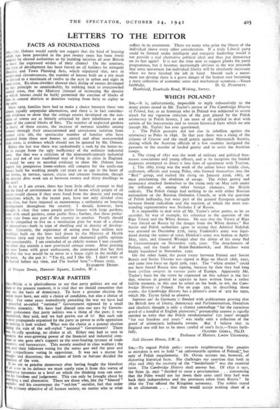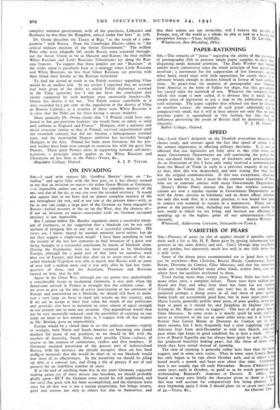Snt,—To regard Polish policy towards neighbouring Slav peoples as mistaken
is not to hold " an unfavourable opinion of Poland,', but only of Polish megalomania. Dr. Ostoja accuses me, however, of distorting historical facts. She challenges my assertion that both in 1830 and 1863 the recovery of the " borderlands was the essential issue. The Cambridge History shall answer her. Of 1830 it says, the Sejm (p. 299) " decided to issue a proclamation . . . announcing that the Poles would not lay down their arms until they had won back their independence and the provinces taken from Russia." In 1862 the Tsar offered the Kingdom autonomy. The nobles stated in an ultimatum . . . that they would accept nothing short of a
complete national government, with all the provinces, Lithuania and Ruthenia no less than the Kingdom, united under free laws " (p. 376).
Dr. Ostoja describes the Treaty of Riga " as the result of a com- promise " with Russia. Even the Cambridge History refers to " the critical military position of the Soviet Government." The million Poles who were allegedly left inside Russia were scattered through- out the Soviet Union as far as Moscow and Kazan; the four million White Russians and Little Russians (Ukrainians) lay along the Rus- sian frontier. To suggest that these peoples are not " Russians " in the wider sense is peculiarly base at a moment when Little Russians and White Russians, no less than Great Russians are proving with their blood their loyalty to the Russian fatherland To find the kernel of truth in the Polish statistics regarding Vilna would be an endless task In my review I regretted that no account had been given of the shifts to which Polish diplomIcy resorted in the Vilna question; but I did not draw the conclusion that claims supported by such methods were necessarily baseless—Dr. Ostoja has drawn it for me. The Polish census (unreliable as it was) recorded 62.5 per cent of the population of the district of Vilna as Roman Catholic; as a number of these were White Russians it is clear that the Poles are far from having a secure majority.
More generally Dr. Ostoja claims that " if Poland could have out- lasted in her pre-partition frontiers she would form an entity as solid and uniform as England and France." Hungary, with a national and social structure similar to that of Poland, survived unpartitioned until the twentieth century, but did nor become a homogeneous national state, and the incorrigible Magyar ambition has inevitably brought Hungary to the Axis. Poland has been more fortunate, for her pre- sent leaders have been wise enough to associate her with the great free Powers. These great Powers unite in supporting national self-deter- ruination, a principle which applies to the White Russians and Ukrainians no less than to the Poles.—Yours, &c.,



























 Previous page
Previous page